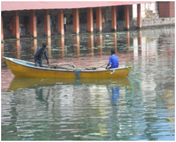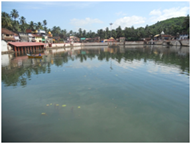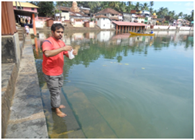Kotiteertha or temple pond with daily sacraments constitute the vital ecosystem linking the culture with the society in India. The sharp increase of devotees performing rituals within and around the temple premises in the last decade, and lack of regular maintenance of temple pond has led to the eutrophication. Disposal of ritual constituents’ rich in organic matters beyond the bioremediation potential has led to the enrichment of nutrients, evident from the enhanced primary productivity with rampant growth and spread of macrophytes and filamentous algae. This has posed serious threat to the sustenance of pond ecosystem. In this context, ecological investigations were carried out the Gokarna temple pond - Kotiteertha, located at Gokarna village, Kumta taluk, Uttara Kannada district, Karnataka in response to the requests from progressive youth of Gokarna temple town. The investigation included the assessment of physical and chemical parameters with the biotic components (spread and distribution of aquatic plants and algae). The results reveal of higher nutrient levels, signifying more cultural pressure due to (i) disposal of organic materials (flowers, rice balls, linseed, banana, curd, ghee, etc.) after performing rituals, (ii) bathing of large number of devotees, (iii) washing of cloth with detergents, (iv) disposal of solid waste and (iv) washing of utensils, etc. The algal diversity analyses show the proliferation of filamentous cyanophycean members and minimal suspended algae. Higher biomass growth, productivity and spread of aquatic plants Vallisneria spiralis, Nymphae nouchali, followed by Certophyllum demersum and Blyxa species highlight of nutrient enrichment. The overgrowth of such species triggers internal nutrient loading leading to further enrichment and subsequent deterioration of water quality. Discussion with all stakeholders (26th September 2015) led to the transformation of the pond. Gokarna Panchayath officials entrusted the work of regular maintenance to an NGO – Akshay Rural Help Charitable Trust (R), Gokaran, who undertook the initiative of pruning macrophytes and also made alternate arrangements for disposal of organic materials (of rituals) in the pond. These interventions has seen the improvements in water quality in 45 days. As part of bio manipulation, fish species were introduced on 1st November to feed on micro algae as well as organic materials. This issue discusses the status of Kotiteertha and highlights the need for cost-effective ecological interventions for sustainable management of lentic water bodies. Status of the water body as on 2nd December 2015: Sign of the Success of stakeholders participation in Management of local water bodies
|
|
|
|


